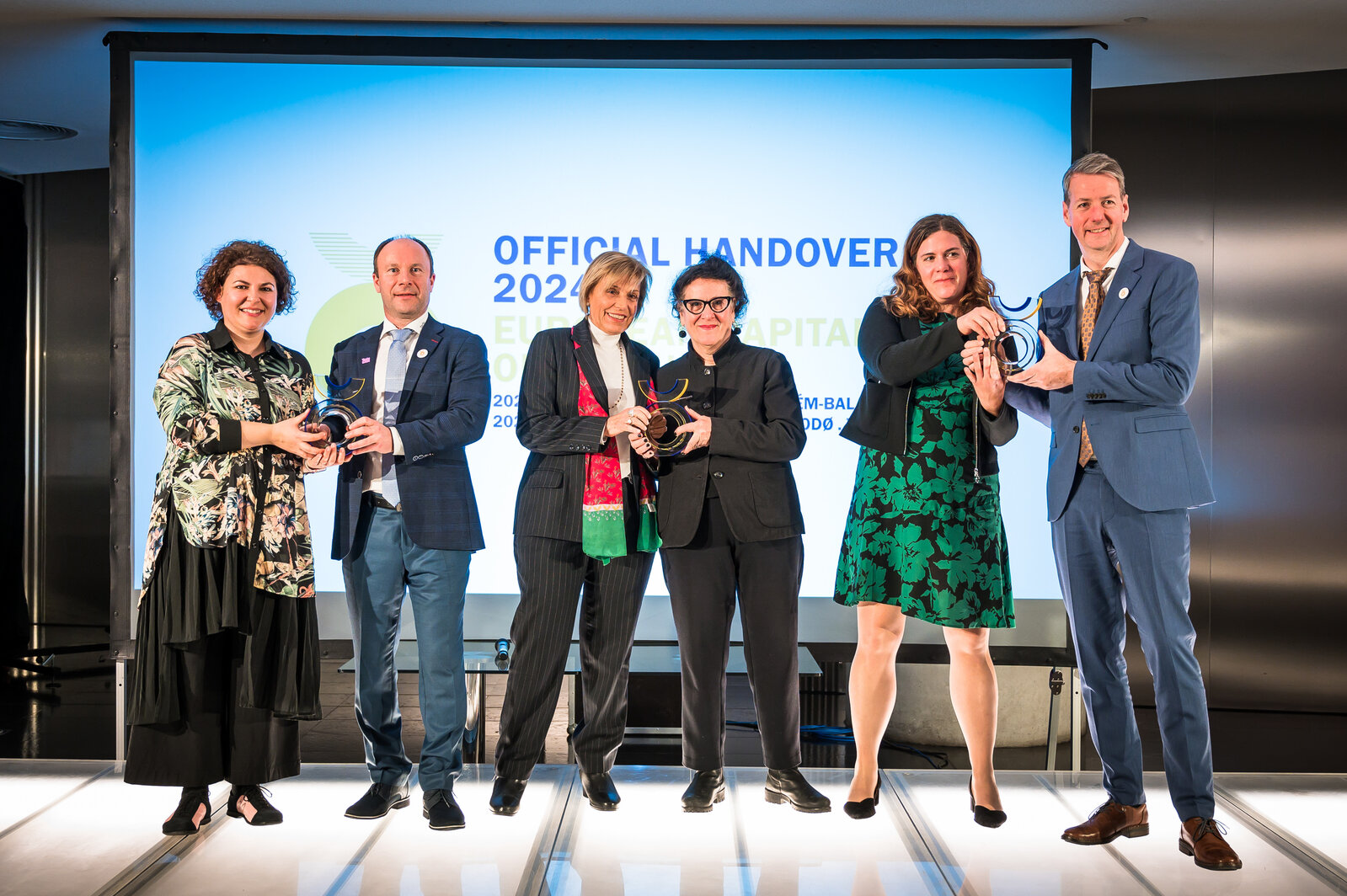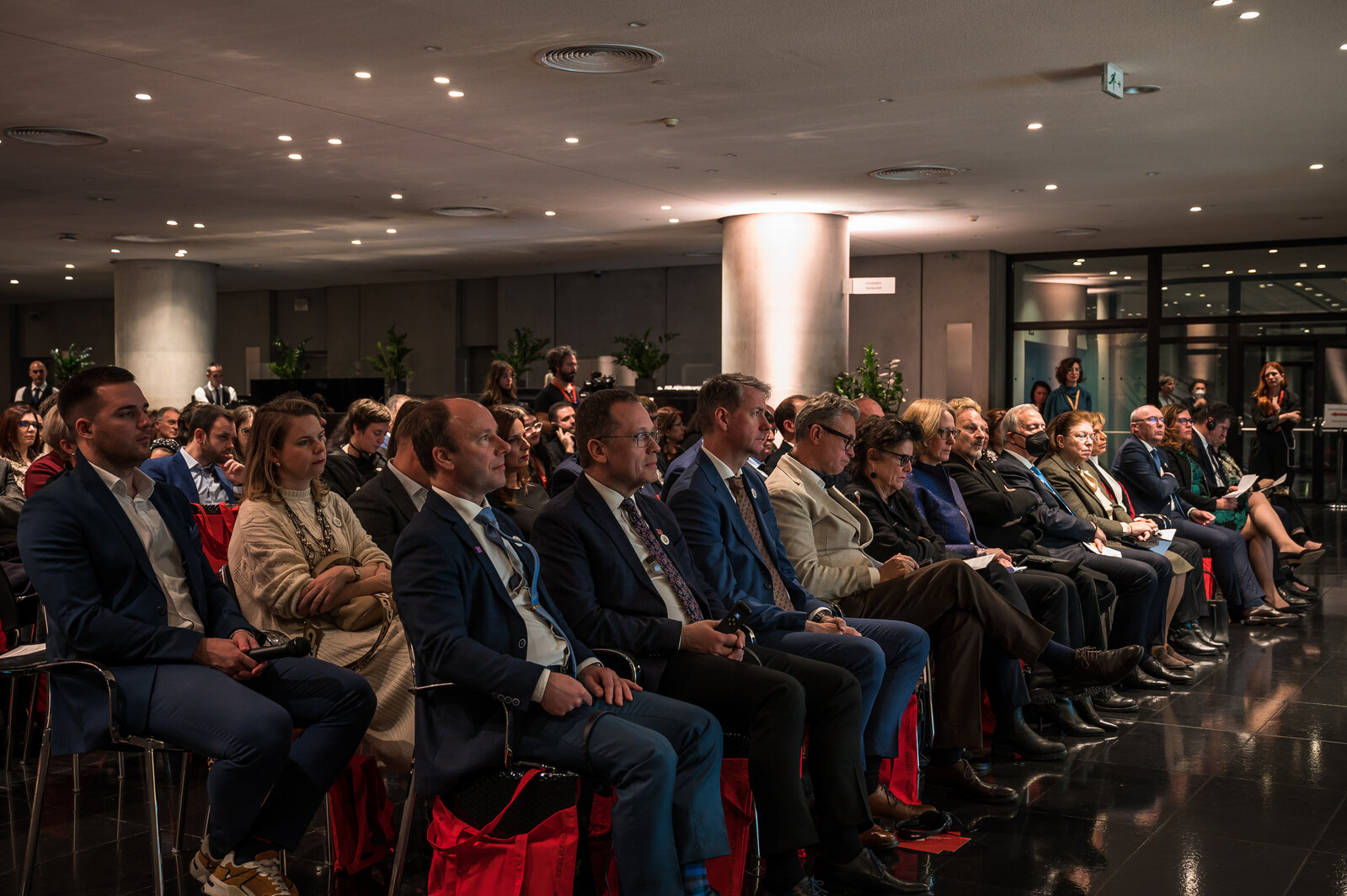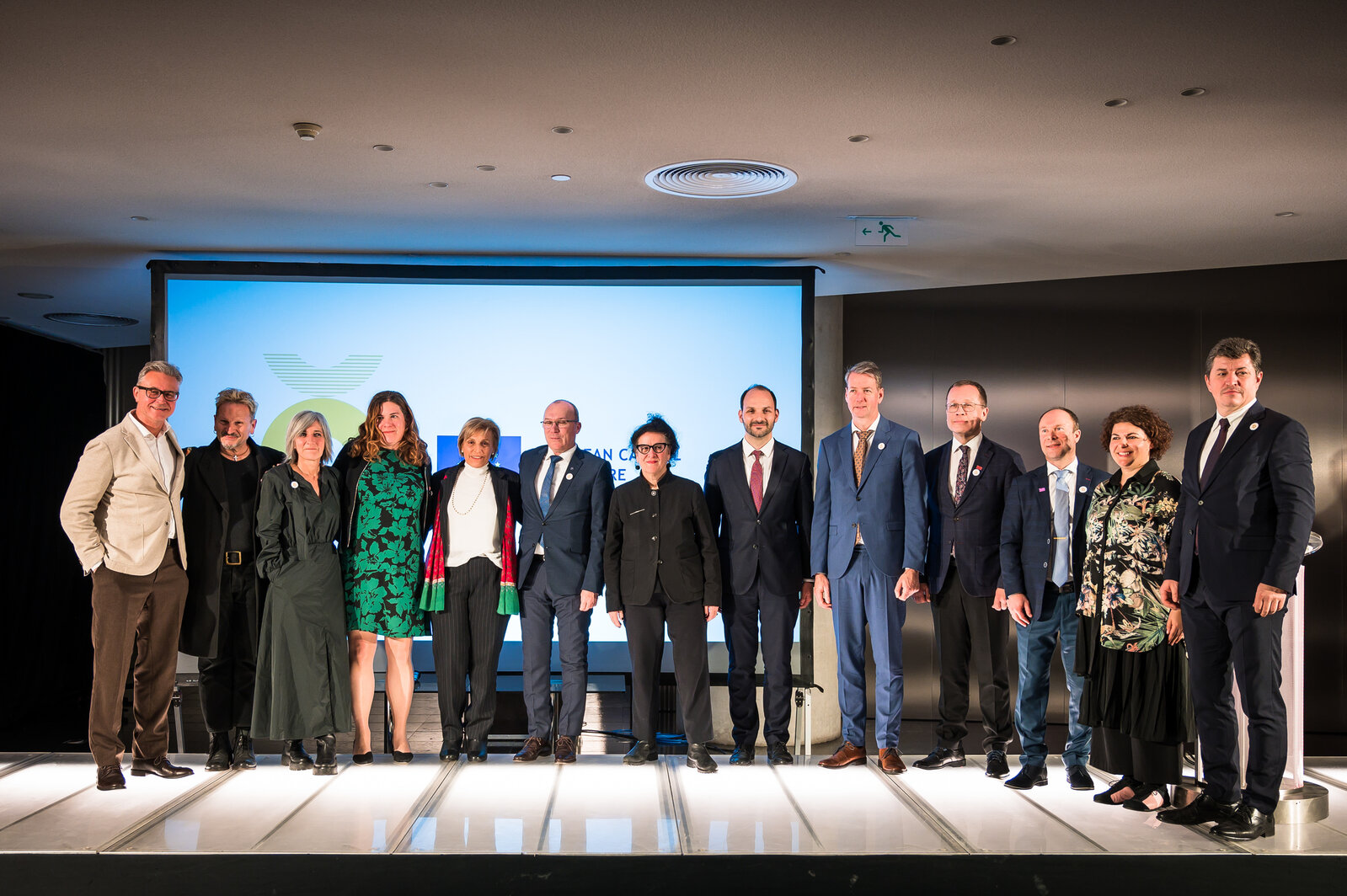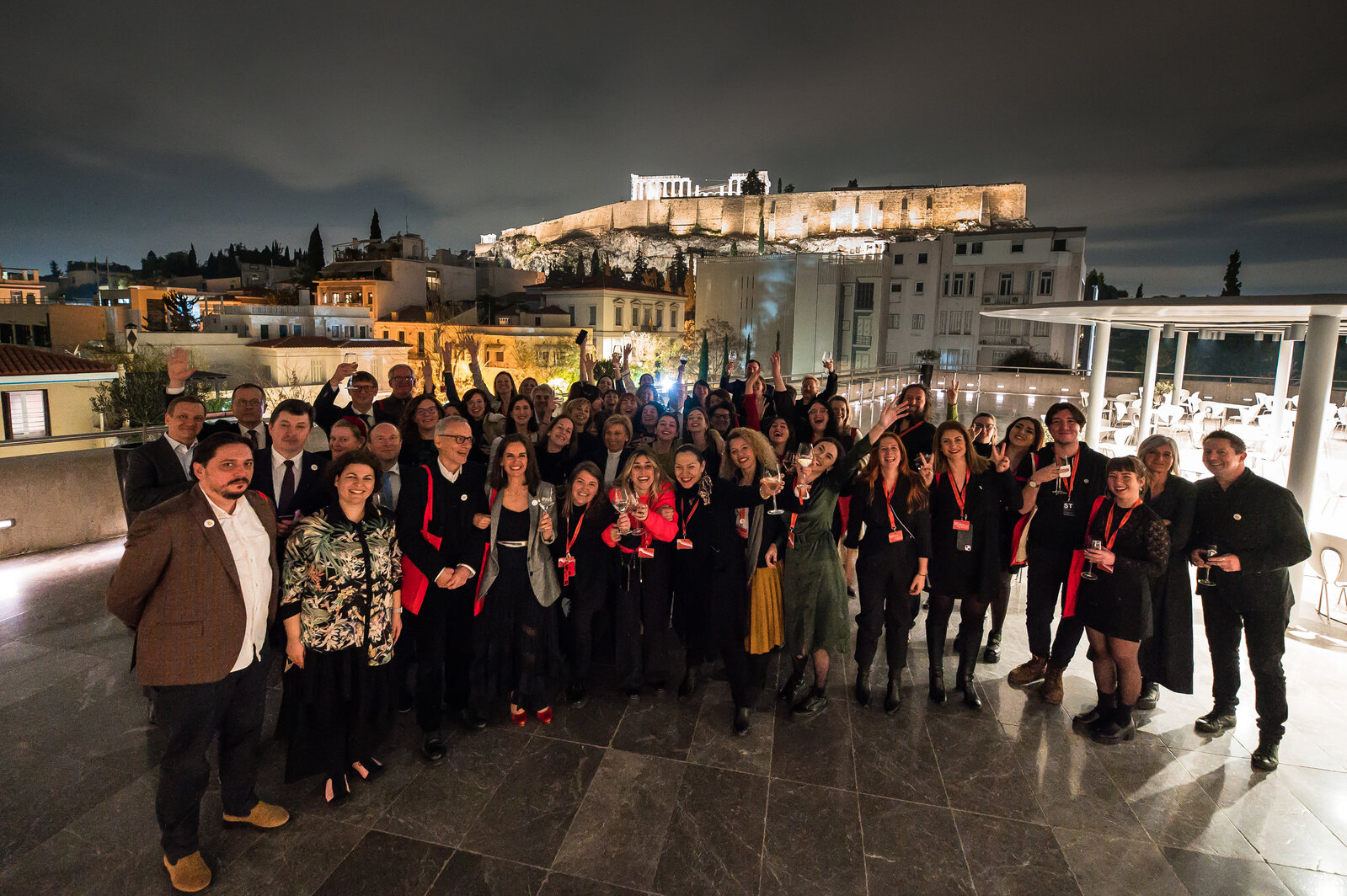A Flame for Culture and a Common Future
On 11 January 2024, the European Capitals of Culture (ECoCs) of 2023 officially handed over their titles to the cities and regions which will represent the European Capitals of Culture in 2024. Elefsina (Greece), Timișoara (Romania) and Veszprém-Balaton (Hungary) passed on the title to Bad Ischl Salzkammergut (Austria), Bodo (Norway) and Tartu (Estonia), during a ceremony which took place for a second year in a row at the Acropolis Museum in Athens.

Photo: John Kouskoutis
A flame for culture and a common future! Since 1985, when Athens was designated as the first European Capital of Culture on the initiative of Melina Mercouri, former Greek Minister of Culture, along with her French counterpart, Jack Lang, more than 60 cities across the European Union and beyond have been awarded the title. The objective was to gather European citizens closer together by highlighting the wealth and diversity of European cultures and raising awareness of their common history and values. European Capitals of Culture collaborate, bringing people and cultures together. To strengthen this cooperation and stress the importance of celebrating culture – our common fundamental right and pillar of the European way of life – an Official Handover ceremony is held in Athens, Greece, as an opportunity for Official Representatives to reaffirm the meaning and purpose of the European Capitals of Culture and the unique experience the go under.
Official Handover 2024
The evening’s moderator, the journalist Elena Papadimitriou, welcomed all the attendants at the Handover Ceremony 2024. “Tonight, here at the Acropolis Museum in Athens, we witness the symbolic passing of the flame, as the three European Capitals of Culture for 2023 officially hand over their titles to the cities set to represent this prestigious honour in 2024.
Nikolaos Stabolidis, Director of Acropolis Museum took the floor and stated that “Athens should be the city where all hand overs, these ceremonies will take place at the Acropolis Museum. I will very much love and accept this proposal.”
Gyula Porga, Mayor of Veszprém, underlined the importance of the ECoC 2023 title for the city, noting that “ the key to our success was cooperation and that everyone could take part in the creating and forming of the programmes as well besides participating in them.” Friderika Mike, Director of programme development of Veszprém-Balaton 2023 referred to the “3,500 cultural events that attracted residents and visitors to Veszprém and the region’s 116 towns, cities and villages” and shared her “hope and wish that the 2024 ECoC cities will benefit from the efforts just as much as we did by building a Region of Creativity in Veszprém.”
Cosmin Tabără, Deputy Mayor of the Municipality of Timișoara, proudly stated that “Timișoara couldn’t have won the title at a better juncture, as it revived its creative spirit and sparkled the pride of residents for their city. In total, 1.3 million participants enjoyed the 2,000 events that took place this past year and more than 3,000 volunteers flooded the city.” Ms Ramona Laczko David, Timișoara 2023 Programme Coordinator, continued by laying emphasis on the fact that “programmes like the European Capitals of Culture are not just a one-year event. They are in fact a major layer in the transformation of cities and in realising how culture can be a driving force in keeping cities sustainable, accessible, and appealing in an increasingly challenging global political context, marked by a multitude of environmental challenges.”
Ms. Lina Mendoni, Minister of Culture of Greece, mentioned that “despite the fact that the European Capital of Culture is an initiative of the state, the case of 2023 Eleusis was instantly embraced by civil society and the artistic community. [...] European culture is neither a succession nor a confluence of intellectual and artistic currents. On the contrary, it is a long-standing, deep cultural capital that remains alive and vital, evoking innovation and creativity.” After thanking the ECoCs of 2023, Ms Soultana (Nana) Spyropoulou, CEO of 2023 Eleusis, addressed those of 2024 stating: “This journey holds many challenges, but with strength, patience – and, above all, faith in the idea that culture unites people, countries, and the whole of Europe, it can be a powerful agent of sustainable development. I am confident of your success.”
The Austrian Ambassador in Greece, H.E. Ms. Gerda Vogl noted that “culture is a wonderful and potent unifying element,” that she personally enjoyed “the very successful ECoC of Elefsina 2023,” and wished “great success also to the first ever non-urban European Capital of Culture in the beautiful region of Bad Ischl Salzkammergut in Austria for 2024!” Elisabeth Schweeger, 2024 Bad Ischl Salzkammergut Artistic Director, insightfully pointed out that “at a time where isolationism is increasing and gaps are widening, art and culture could be the only means to hold back these centrifugal forces and help bridge these rifts.”
Odd Emil Ingebrigtsen, Mayor of Bodø, took the floor reminding that “for the first time ever a city in the Arctic has been chosen to be among the European Capitals of Culture,” hoping that “through the Bodø2024 project we can also develop new business collaborations.” André Wallann Larsen, General Director at Bodø2024, on behalf of the whole team, stated that “Bodø2024 is very proud to take over the baton from the three 2023 cities,” and in this difficult situation with a war even in Europe itself, “the European Capital of Culture is peace work in action.”
Mayor of Tartu, Urmas Klaas, stressed out that “the year-long programme will bring over 1,000 events to people of all ages, it will present the story of the Arts of Survival, which is truly crucial,” and that “inspired by the cultures and diversity of Europe, we build a better tomorrow.” Following on, Kuldar Leis, Tartu 2024 CEO, presented his city’s convivtion that “the European Capital of Culture is a co-creation of grandparents, mothers, fathers, and children alike. By creating together, we can create a more connected community, more connected society, more connected Europe.”
Among the highlights of the event was the joint moment of toasting. Michail Marmarinos, 2023 Eleusis General Artistic Director, invited on stage the representatives of 2023 and 2024 ECoCs to share toasts and celebrate togetherness, to the sounds of Nicky Kokkoli’s saxophone. In his own words “in the Greek language, these drinks we’re sipping contain in their name the word ‘PNEUMA,’ which means ‘spirit’! As such, this is a spiritual ceremony! Toasting seems to be one of the oldest and deepest rituals among humans as it is spectacularly depicted by an ancient Greek figurine that dates back to 2700 BC, “the cup bearer,” poised as if ready to propose a toast. Τoasting may transcend all boundaries – even that of Time. Βy this very human ceremony, this very moment we experience something that is not to be underestimated; Alliance, Unity! Unity! Unity!”
Nancy Braun, General Director at Esch2022 European Capital of Culture, who was the visionary behind the idea of the Athens ECoC Official Handover Ceremony, said “This event is a significant moment! It was a special gesture reminding us of our common mission. We stand together for a united European culture that promotes cohesion and peace. I am very proud to be a member of this wonderful family of ECoCs and humbly contribute to the European way of life.”
The event was honoured by the presence of Team Leader for Cultural and Creative industries of the European Commission, Mr. Sylvain Pasqua, Deputy Minister of Foreign Affairs, Mr. Georgios Kotsiras; members of Parliament for Western Attica, Mr. Athanasios Bouras and Mr. Evangelos Liakos; Deputy Regional Governor for Spatial Planning, Urban Planning Issues & Applications, Mr. Eleftherios Kosmopoulos; Deputy Regional Governor of Western Attica Mr. Cleanthes Varelas; Deputy Mayor for Culture of the City of Athens, Ms. Eleni Zontirou; Deputy Mayor for Education of the City of Athens, Mr. Panagiotis-Paris Charlaftis. Also present were the President of the Municipal Council of Elefsina, Ms. Maria Charalampidi, the Deputy Mayor with responsibilities of the former Central Union of Municipalities of Greece, Mr. Charalambos Tzafaras, as well as Municipal Councilors Mr. Leonidas Pappas, Ms. Evaggelia Vezou, Mr. Dimitrios Tsatsis, Mr. Efstratios Talaveridis, Mr. Ioannis Giannikos, Mr. Georgios Iliopoulos. Mr. Dimitris Papagiannaros and Mr. George Liontos attended the ceremony on behalf of the Board of Directors of 2023 Eleusis. Additionally, present at the event were Ms. Georgia Lassanianou, Director of Corporate Responsibility of the Hellenic Petroleum Group; Mr. Ioannis Kyriakopoulos, General Manager of Real Estate; and Ms. Elli Kakoullou, Assistant General Manager of Real Estate of the National Bank of Greece Group.

Photo: John Kouskoutis
UNITY – The Flame
The Official Handover as well as European history were symbolically embodied by an art sculpture, a work by Luxembourgish glass sculptor Pascale Seil (“Made by Seil”). Structure: for power and infinity. Glass: for transparency and lightness. Colours: for diversity and cohesion. UNITY FOR EUROPE. The glass sculpture was inspired by a famous story from Greek mythology: the abduction of King Agenor’s daughter, Phoenician maiden “Europa,” to which the continent owes its name. The myth of Europa, who infatuated Zeus, the king of all Olympian Gods, with her striking beauty and grace, has inspired many writers, historians, painters, and European politicians throughout the centuries. The nymph Europa also inspired the Luxembourg artist Pascale Seil to create “The Bull.” Based on Greek mythology, Zeus metamorphosed into a white bull to escape the anger of his wife Hera. He kidnapped Europa and took her to the island of Crete, where he revealed his true identity and impregnated her. Europa gave birth to Minos, who would become king of Crete.
The horns of “The Bull” represent power; the circle, which carries the horns of the bull, represents volenity and infinity. The sculpture is constructed of 47 layers of coloured glass, each representing one of the European countries. It evokes transparency and lightness, as well as movement through the twisting of the coloured layers. The colours of Europe – blue and yellow (gold) – dominate. The history, the shapes, and the colours of all the different layers symbolise Europe as a unified body composed of individual identities and peculiarities.
About ECoCs 2023
Elefsina, Greece
Mysteries of Transition
Elefsina is one of the five sacred cities of antiquity, birthplace of the great tragic poet Aeschylus, and for more than a century a centre of heavy industry in Greece, located 21 km west of Athens. With a population of just 30,000 inhabitants – a rare human mosaic composed of diverse communities of different origins – with a great historical and mythological richness, but also bearing vivid traces of deindustrialisation, it is one of the smallest cities in the history of the institution. Its historic selection by the European Commission has unleashed the collective imaginary, opening the way for every small region of Europe to envision and claim this honourable and demanding title. The artistic, research and educational programme of 2023 Eleusis titled MYSTERIES OF TRANSITION was structured around three strategic axes –People/Society; Environment; Labour– and has so far involved more than 6,000 artists, cultural workers, members of cultural associations, children and teenagers. At the same time, 10 new spaces have been created, renovated or activated, and handed over to the city as part of the material heritage, to host artworks, theatre performances, concerts, educational activities, film festivals, eco-cultural activities, etc., while a rich programme of educational and artistic activities still being carried out in the city, which will expected to continue for years to come. The Capital of Culture has marked a new era for Elefsina, revealing its unseen side, making it a nucleus of cultural education and creativity, as well as a destination for cultural tourism at national and international level.
Timișoara, Romania
Shine Your Light! Light Up Your city!
Over 2,000 events, organised by more than 800 Romanian and international organisations, ranging from contemporary dance performances in hidden courtyards to sound installations in synagogues, first-ever concerts in Romania to contemporary art exhibitions in museums and unexpected spaces, creative workshops and conferences, among others, have lit up the city in 2023 and will continue to do so in 2024. The European Capital of Culture has reinforced the belief that culture plays a significant role in the social and economic development of the city and that the power of imagination is essential in the transformative journey of the city. The richness of the urban texture, including over 10,000 historic buildings, generous public spaces, and historic neighbourhoods with distinct identities, combined with the development of blue-green corridors along the Bega Canal, makes the city attractive to families, professionals from all over the world, and free spirits backpacking across Europe.
Veszprém-Balaton, Hungary
Shine!
The idea was already formulated 100 years ago: the city of Veszprém can maintain its cultural leadership only if the surrounding region also joins in. In accordance with this spirit, in 2023 more than 3,500 cultural events attracted residents and visitors to Veszprém and the region’s 116 towns, cities, and villages. The cultural institutions of Veszprém and the Ballaton region have become part of the international vibrant cultural mobility. Tourism figures also rose in 2023, over 1.5 million people visited the centre of Veszprém. All these results have contributed to fulfilling the ECoC mission: to further develop Veszprém and its region as a prominent location for the creative and cultural industries, making use of local assets, values of nature, culture, and traditions.

Photo: John Kouskoutis
About ECoCs 2024
Bad Ischl Salzkammergut, Austria
Culture is the New Salt
It’s the first European Capital of Culture in a rural Alpine landscape, which brings together inhabitants from 23 municipalities and two federal Austrian states that will work together for an entire year. The European Capital of Culture Bad Ischl Salzkammergut 2024 will offer a multitude of possibilities for sharing, questioning, and expanding the well-maintained special characteristics, traditions, and points of view of the region. In doing so, the goal is not to neglect these many unique features, but instead to unify them with a larger sense of community.
Bodo, Norway
From Cold to Cool
Bodø will be the first ever European Capital of Culture above the Arctic Circle. The largest cultural project in Norway in over 10 years, Bodø2024 aims to attract over 500,000 visitors for what will be the world’s longest party – a whole year of celebrations in a region that spans over 800 km from North to South! One thousand events will take place throughout 2024. Programme highlights include Europe’s only Land Art Biennale; a big Midsummer’s Eve celebration; Sámi art, film, and theatre; a freedom festival; a historical journey along the Nordland Railway; a concert in a submerged cave; a new 10m-high sculpture out at sea; an exhibition on Nobel literature laureate Knut Hamsun; an opera about stockfish; an Arctic food festival; Nordland’s first ever light festival – and much more.
Tartu, Estonia
Arts of Survival
European Capital of Culture Tartu 2024 is the main event in Estonia and the largest regional cooperation project between Tartu and Southern Estonia. The year-long programme in Tartu and Southern Estonia, bringing 1,000 events to individuals of all ages, presents the story of the Arts of Survival – the knowledge, skills, and values that will help us lead a good life in the future. Inspired by culture, we build a better tomorrow. Tartu 2024 is versatile both in its nature and in its programme. On the one hand, it is a great cultural celebration that draws visitors from Estonia and abroad; on the other, it is an opportunity to include as many people as possible in laying the groundwork for long-term change in Tartu and Southern Estonia.
Participation in a common project – across borders
Similarly, the European Capital of Culture project perfectly embodies this combination of joint forces, yet carrying so many different facets. Hundreds of artists, institutions, volunteers, and citizens help shape the special title years and lay the foundation for new things that will last through time. They collaborate with each other and bring people and cultures together. Citizens have the opportunity to actively take part in the project and its activities, contributing to the development and cultural expression of their city or region. Each European Capital of Culture drives new energy into the city, and naturally boosts its cultural, social, and economic development. All past, present, and future titleholders should exchange ideas, benefit from each other, and support one another by driving projects together. The cooperation and networking efforts between ECoCs is expressed through projects and initiatives aiming to acheive a long-term impact for the current title year and beyond. In 2023, ECoCs collaborated widely to create a multitude of projects. This established event is an additional component that reinforces and symbolises this cross-border cooperation.

Photo: John Kouskoutis
